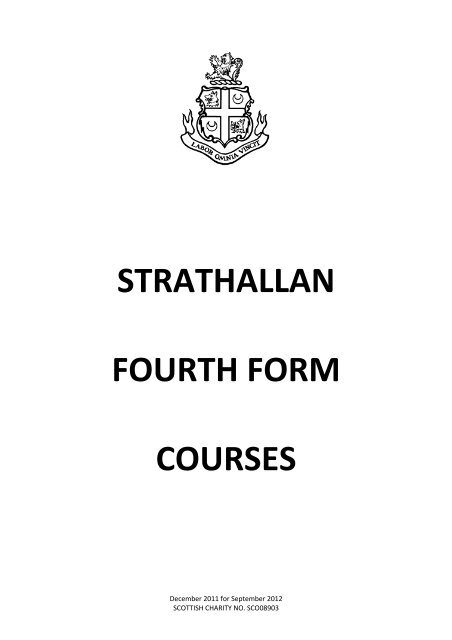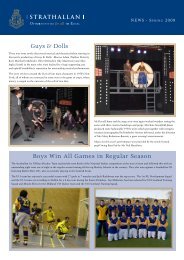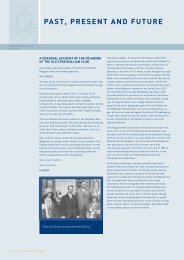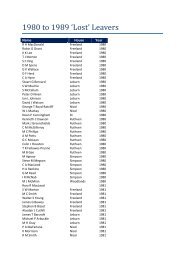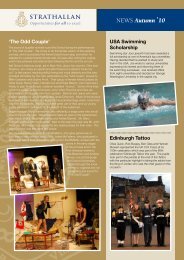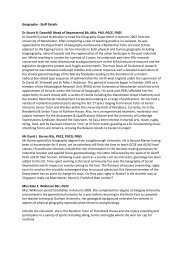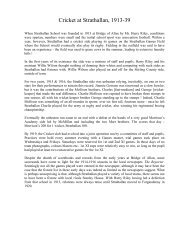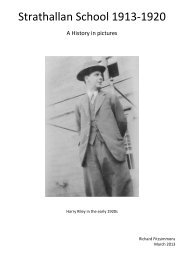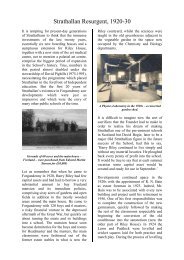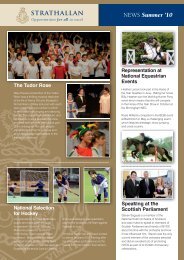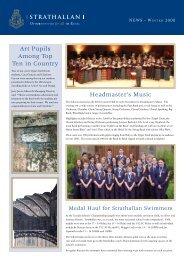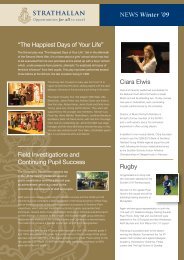Fourth Form Subject Choices PDF 234KB - Strathallan School
Fourth Form Subject Choices PDF 234KB - Strathallan School
Fourth Form Subject Choices PDF 234KB - Strathallan School
You also want an ePaper? Increase the reach of your titles
YUMPU automatically turns print PDFs into web optimized ePapers that Google loves.
STRATHALLAN<br />
FOURTH FORM<br />
COURSES<br />
December 2011 for September 2012<br />
SCOTTISH CHARITY NO. SCO08903
INTRODUCTION<br />
The two year period of study which begins in <strong>Fourth</strong> <strong>Form</strong> culminates in National Certification at<br />
GCSE.<br />
At this stage, a broad and balanced curriculum is essential but some choice amongst subjects is<br />
necessary. Ability and interest and career ideas are normally the main guiding principles in making<br />
choices between subjects, although the only consideration in regard to career ideas is not to give up<br />
subjects which might be required later.<br />
The following subjects are compulsory for all pupils:<br />
English<br />
Mathematics<br />
At least one Modern Foreign Language (from French, German, Spanish)<br />
Physics, Chemistry and Biology (either as GCSE Science or as separate GCSE awards)<br />
Either History or Geography (or both)<br />
The remaining time includes a compulsory lesson in Personal and Social Education and a lesson of<br />
Religious Education. Pupils opting to study their Sciences as separate subjects will also follow a<br />
course in Critical Thinking, of one lesson per week, which will not be examined.<br />
Pupils will be expected to take subjects from one of the following two tables, depending on whether<br />
they wish to take their Sciences as GCSE Science (nine lessons per week, leading to a GCSE in Science<br />
and ad GCSE in Additional Science) or as separate GCSE subjects (twelve lessons per week, leading to<br />
three GCSE awards, one each in Physics, Chemistry and Biology).<br />
This allows pupils to choose an additional subject if they are not intending to pursue the Sciences in<br />
the Sixth <strong>Form</strong> while ensuring that all pupils receive a rounded education in the Sciences.<br />
Separate GCSE Sciences option (GCSE in Biology, Chemistry and Physics)<br />
Choose ONE from Choose ONE from Choose TWO from<br />
Art<br />
Geography<br />
French Business Studies History<br />
Spanish History Computing Latin<br />
German Geography Design & Technology Music<br />
French<br />
Physical Education<br />
German<br />
Spanish<br />
Dual Award Science option (Two GCSEs covering Biology, Chemistry and Physics)<br />
Choose ONE from Choose ONE from Choose THREE from<br />
Art<br />
Geography<br />
French History Business Studies History<br />
Spanish Geography Computing Latin<br />
German Design & Technology Music<br />
French<br />
Physical Education<br />
German<br />
Spanish<br />
2
Notes:<br />
The availability of subject combinations in the Option blocks will be decided upon in order to satisfy<br />
as many combinations of choices as possible once pupils have made them.<br />
The pages which follow give details of the various subjects offered. Further help and advice will be<br />
available to pupils from Housemasters and Careers Adviser, and by the Easter vacation pupils will be<br />
asked for their provisional choices. Parents and teachers will be able to discuss these choices at the<br />
Third <strong>Form</strong> Parents’ Evening.<br />
Pupils will of course be able to make alterations to their choices at a later date, provided such<br />
alterations are within the constraints of the finalized option columns.<br />
Curriculum changes from September 2012<br />
The Scottish Qualifications Authority will no longer offer Standard Grade or Intermediate 2 courses<br />
for pupils entering S3 (<strong>Form</strong> IV) in 2012, consequently Computing, Physical Education and English will<br />
all be offering GCSE courses where they previously used Standard Grade.<br />
The Joint Council for Qualifications is currently reviewing all GCSE exams and we believe that the<br />
Government will shortly announce that there will no longer be any modular courses at this level. At<br />
present many GCSE courses can be taken in smaller sections which add up to a GCSE award, but<br />
<strong>Strathallan</strong> has not followed this model since it increases the number of exams taken and the<br />
consequent disruption to other work, not to mention the expense to parents. We do not, therefore,<br />
anticipate that any changes will affect our pupils. We do expect to hear that Controlled Assessment<br />
– essentially, coursework which is conducted under controlled conditions in class – will be retained.<br />
3
GCSE ENGLISH (AQA)<br />
The English Department offers two AQA GCSE courses, one in English and one in English Language<br />
and English Literature. These are delivered as an integrated course over two years, focussing on the<br />
development of pupils’ language skills in Reading, Writing and Speaking and Listening through<br />
Literature, Non‐Fiction and the Mass Media.<br />
Pupils are set by ability and there is differentiation in the texts chosen and the pace of work.<br />
Students are presented for either English or English Language and English Literature, depending on<br />
their ability and progress, at Higher Tier.<br />
These awards are gained partly through external examination and partly through achievement in<br />
internally Controlled Assessments. Reading and Writing is assessed internally and externally but the<br />
Speaking and Listening element awarded solely by Controlled Assessments.<br />
GCSE MATHEMATICS (EDEXCEL)<br />
By the start of the <strong>Fourth</strong> <strong>Form</strong>, pupils will have been placed in one of five sets according to their<br />
mathematical ability. All pupils follow the Edexcel GCSE course, with the top four sets working<br />
towards the Higher level (where the highest grade attainable is an A*) and the other set usually<br />
working towards the Foundation level (where the highest grade attainable is a C).<br />
Pupils in the top sets will cover the core work on each topic more quickly and will be exposed to<br />
more extension work; pupils in the lower sets will spend more time working through the core<br />
material. Typically pupils will remain in the same set for the two years of the GCSE course, but<br />
teachers rotate at the end of each year.<br />
Coursework is no longer an element of assessment and the final two papers will decide grading.<br />
GCSE FRENCH (AQA)<br />
By the end of the Third <strong>Form</strong> pupils should be well on the way to GCSE, having been practising and<br />
becoming more confident in the four basic skills of Speaking, Listening, Reading and Writing. The<br />
GCSE course is topic based and includes Health, Relationships and <strong>Choices</strong>, Free Time and the Media,<br />
Holidays, Home, Environment, <strong>School</strong> and Future Plans ‐ each affording the opportunity to improve<br />
the basic skills.<br />
In the exam, there are two levels, Foundation and Higher, and a pupil may enter at either level for<br />
each skill. This means that the choice of level must be made very carefully, but it does give a pupil<br />
the chance to enter Higher papers for his/her strongest skills and Foundation papers for the weaker<br />
ones. Foundation papers are only available for Listening and Reading. The skills are not equally<br />
weighted, and the AQA examination places extra emphasis on the productive skills of Speaking and<br />
Writing (30% each) rather than the receptive skills of Listening and Reading (20% each). Speaking<br />
and Writing are examined by Controlled Assessment which is an ongoing process, beginning at the<br />
end of the <strong>Fourth</strong> <strong>Form</strong> and resulting in the production of pieces of work which are submitted to the<br />
AQA for moderation after having been marked by the teacher here. Speaking and Writing are only<br />
available at one level, which covers all grades. Learning a language is a very active process and<br />
pupils will be expected to participate and contribute in class a great deal of the time. It is also a<br />
continuous process, which means that the material learned is constantly used and revised.<br />
4
The study of French to GCSE will open the door to further studies at A Level or SQA Higher grade,<br />
although even if the language is not continued beyond GCSE the course will have inculcated skills<br />
which can be used and built on later in life.<br />
GCSE GERMAN (AQA)<br />
Those who have enjoyed the Third Year course in German are encouraged to continue with the<br />
language to GCSE and beyond, if they wish. As well as being a language of great subtlety and<br />
tremendous expressive power it is also more widely spoken than French. Germany is an important<br />
economic power in Europe, with ever increasing influence over the Eastern European markets. Thus,<br />
command of the German language will remain an important advantage for cultural, scientific and<br />
business careers as well as being rewarding in itself and beneficial to an understanding of our own<br />
language.<br />
The GCSE language courses are all very similar in content, and the comments on the structure of the<br />
French course also apply to German. The examination stresses the use of German in all four skills,<br />
with the minimal use of English. Successful completion of the GCSE course will put you in a good<br />
position to take an A level or Higher, and will leave you with a valuable skill if you choose not to take<br />
the language any further.<br />
GCSE SPANISH (AQA)<br />
Those pupils who followed the foundation course in Spanish in the Third <strong>Form</strong> are invited to embark<br />
on the two year GCSE course in the <strong>Fourth</strong> <strong>Form</strong>. Spanish is the third most widely spoken language in<br />
the world after Mandarin and English, and its significance in the increasingly important European and<br />
American markets cannot be overemphasised.<br />
Pupils will follow a course similar to the French and German topic‐based ones and they will acquire<br />
an insight into the culture and character of Spain and other Spanish speaking countries as well as<br />
learning the language. By the end of Fifth <strong>Form</strong>, they will have a solid grounding in Spanish, enabling<br />
them to move on to the added challenges of Higher or A level work if they so choose.<br />
GCSE DUAL AWARD SCIENCE (AQA)<br />
(Physics, Chemistry and Biology)<br />
The Dual Award Science course covers all three sciences and is taught in three lessons per science<br />
per week, thus offering an additional option to those pupils who do not wish to specialise in the<br />
Sciences or who wish to take an additional subject from another curriculum area.<br />
There are two GCSEs to be gained through Science; these are called GCSE Science B and GCSE<br />
Additional Science. The B in Science B refers to the curriculum for that GCSE.<br />
Both GCSEs will be examined at the end of the Fifth <strong>Form</strong> and consist of a separate test on each of<br />
the three sciences.<br />
5
The exams for each GCSE may be entered at either of two tiers: Foundation and Higher. The<br />
departments will enter pupils for the tier which best matches their ability. It is expected that pupils<br />
wishing to take a science in the Sixth <strong>Form</strong> would be able to perform well at the Higher level at GCSE.<br />
The following points should be noted:<br />
A separate grade is awarded for the Science and the Additional Science GCSE, the grade being<br />
awarded on the combination of marks in the three separate papers plus the Independent Practical<br />
Assessment.<br />
The Independent Practical Assessment is referred to in Exam Board publications as “Coursework”,<br />
but it is in fact a practical assessment followed by a short exam. It is not a project on which pupils<br />
work in their own time.<br />
The two awards in Science B and Additional Science are the basis for starting AS Level courses under<br />
the A Level exams which started in 2008. Separate qualifications in each Science are not required.<br />
GCSE SEPARATE SCIENCE COURSES (AQA)<br />
Pupils who feel that the Sciences are likely to form an important part of their Sixth <strong>Form</strong> courses may<br />
wish to opt to take the subjects on to a more advanced level in the GCSE years, and this is covered by<br />
the Separate Science courses. Pupils taking this option will study for and sit an additional GCSE paper<br />
in each Science and will be able to gain three GCSE awards at the end of Fifth <strong>Form</strong>. They will have<br />
four lessons of each Science per week, and will thus have one fewer option in the other curriculum<br />
areas; they will also follow a course in Critical Thinking for one lesson per week, which is not<br />
examined.<br />
In each of the three Sciences, the grade is determined by three one‐hour written papers at the end of<br />
fifth form plus a practical controlled assessment. The written papers may be entered at either of two<br />
tiers: Foundation and Higher. The departments will enter pupils for the tier which best matches their<br />
ability.<br />
The course comprises the following units;<br />
Unit 1 (25%)<br />
Keeping healthy<br />
Nerves and hormones<br />
The use and abuse of drugs<br />
Interdependence and adaptation<br />
Energy and biomass in food chains<br />
Waste materials from plants and animals<br />
Genetic variation and its control<br />
Evolution<br />
GCSE BIOLOGY<br />
Unit 2 (25%)<br />
Cells and simple cell transport<br />
Tissues, organs and organ systems<br />
Photosynthesis<br />
Organisms and their environment<br />
6
Proteins – their functions and uses<br />
Aerobic and anaerobic respiration<br />
Cell division and inheritance<br />
Speciation<br />
Unit 3 (25%)<br />
Movement of molecules in and out of cells<br />
Transport systems in plants and animals<br />
Homeostasis<br />
Humans and their environment<br />
Unit 4: Controlled assessment (25%)<br />
Planning Assessing and managing risk<br />
Collecting primary and secondary data<br />
Selecting and processing data<br />
Analysing and interpreting data<br />
Using scientific models and evidence to develop explanations<br />
It is expected that pupils wishing to take Biology in the Sixth <strong>Form</strong> would be able to perform well at<br />
the Higher level of GCSE Biology and Chemistry.<br />
The course comprises the following units:<br />
Unit 1 (25%)<br />
Fundamental ideas<br />
Rocks and building materials<br />
Metals and their uses<br />
Crude oil and fuels<br />
Products from oil<br />
Plant oils<br />
Our changing planet<br />
Unit 2 (25%)<br />
Structure and bonding<br />
Structure and properties<br />
How much? – Calculations from equations<br />
Rates and energy<br />
Salts and electrolysis<br />
Unit 3 (25%)<br />
The Periodic Table<br />
Water<br />
Energy calculations<br />
Analysis and synthesis<br />
Organic chemistry<br />
GCSE CHEMISTRY<br />
7
Unit 4: Practical assessment (25%)<br />
Planning, Assessing and managing risk<br />
Collecting primary and secondary data<br />
Selecting and processing data<br />
Analysing and interpreting data<br />
Using scientific models and evidence to develop explanations<br />
<strong>Fourth</strong> <strong>Form</strong> topics:<br />
Forces and Motion<br />
Electromagnetic Waves<br />
Basic Electricity<br />
Radioactivity<br />
Work and Energy<br />
GCSE PHYSICS (AQA)<br />
Fifth <strong>Form</strong> topics<br />
Electromagnetism<br />
Medical applications<br />
Turning Effects of Forces<br />
Revision of Thermal Energy and Energy Conservation<br />
A good performance in the Physics GCSE would be expected from someone wishing to take Physics A<br />
level in the Sixth <strong>Form</strong>.<br />
GCSE COMPUTING (OCR)<br />
The digital age presents us with computers at every turn of life and as pupils’ progress through<br />
school they will encounter computer use in many subjects. Most pupils will have basic IT skills but<br />
Computing at GCSE goes far beyond this and aims to give a detailed knowledge of how computers<br />
operate, thus letting pupils see a greater potential in the machine they need to use. This is a useful<br />
qualification to have on a CV and provides a very good start to either Sixth <strong>Form</strong> course: Higher<br />
Information Systems or A‐level Computing.<br />
The course aims to:<br />
• Gives learners a real, in‐depth understanding of how computer technology works.<br />
• Provide excellent preparation for higher study and employment in the field of Computer<br />
Science.<br />
• Develop a transferable set of skills in critical thinking, analysis and problem‐solving through<br />
the study of computer programming.<br />
The OCR GCSE has three units:<br />
1. Computer Systems and Programming<br />
This provides an in depth look at the workings of computer hardware and systems software,<br />
an advanced look at databases and their role in the modern world for managing the storage<br />
of large quantities of information and an investigation into networks and how the Internet<br />
works.<br />
8
Programming is a key part of any Computing course and computer programs are developed as<br />
solutions to problems. This course teaches problem solving through a robust methodology of<br />
analysis, design, testing and evaluation. The skills taught are transferrable and can be used in<br />
other areas of the school curriculum as well as in any large scale project.<br />
This unit is assessed through an external exam.<br />
2. A Practical Investigation.<br />
Pupils will be given a topic to investigate. This involves research into a relevant current issue<br />
of computing in the real world and pupils will apply the skills of analysis from unit 1 to<br />
develop a practical solution. This provides an opportunity for improving and extending<br />
research skills as well as learning complex use of software packages.<br />
This unit is a controlled assessment.<br />
3. Programming Project.<br />
Candidates apply the problem solving and solution building skills from unit one, to develop<br />
suitable algorithms and a programmed solution to a problem. This unit gives an opportunity<br />
to develop an extended piece of programming and provides an insight into how larger<br />
software systems are developed.<br />
This unit is a controlled assessment.<br />
GCSE GEOGRAPHY (AQA)<br />
The AQA GCSE Specification A course comprises traditional units of study over a period of two years<br />
with an increased emphasis on the problems arising from human interaction with the physical<br />
environment. The use of case studies is seen as fundamental to achieve a meaningful understanding<br />
of the varied course units. Topics include global ecosystems, tectonic activity, climate, river, glacial<br />
and coastal landscapes, the development gap, globalisation, tourism and the changing urban and<br />
rural environments as well as problems arising from increases in world population.<br />
The assessment comprises three units:<br />
Unit 1: Physical Geography (37.5% of total GCSE mark).<br />
Section A: Section B: Pupils answer three<br />
• The Restless Earth • Water on the Land questions, one from<br />
• Rocks, Resources and<br />
Section A and one from<br />
• Ice on the Land<br />
Scenery<br />
Section B plus free choice<br />
• Challenge of Weather and<br />
of one other topic from the<br />
• The Coastal Zone<br />
Climate<br />
list above.<br />
• Living World<br />
9
Unit 2: Human Geography (37.5% of total GCSE mark).<br />
Section A: Section B: Pupils answer three<br />
• Population Change • The Development Gap questions, one from<br />
• Changing Urban<br />
Section A and one from<br />
• Globalisation<br />
Environments<br />
Section B plus free choice<br />
• Changing Rural<br />
of one other topic from<br />
• Tourism<br />
Environments<br />
the list above.<br />
Unit 3: Local Fieldwork Investigation (25% of total GCSE mark).<br />
The <strong>School</strong> selects a task based centred upon the eleven topics from Unit 1 and 2 (above) two years<br />
prior to submission. These will be provided in the form of statements from AQA and will change<br />
annually. Pupils complete an investigation (maximum 2000 words) under the direct supervision of a<br />
teacher. It is expected that this task may take up to 20 hours with additional time to collect primary<br />
data in the field.<br />
Foundation and Higher Tier:<br />
The Foundation Tier (grade G‐C) papers examine exactly the same material as Higher Tier (grade D‐<br />
A*) but in an easier format. For example, pupils are given more prompts, particularly with<br />
terminology, and less extended written answers are required.<br />
Pupils and parents will be advised on which Tier of exam unit would suit them most in the Vth <strong>Form</strong><br />
Spring Term reports and the choice can be discussed at the V <strong>Form</strong> Parents Meeting. There has been<br />
considerable investment in upgrading all GCSE text specifically selected to assess the pupils’ progress<br />
at both levels of enquiry.<br />
The GCSE course offers a wide degree of choice, flexibility, a variety of geographical and transferable<br />
skills, and an awareness of contemporary issues within manageable course content. It is designed to<br />
develop an appreciation of the dynamic earth parallel to human and physical interactions in time and<br />
space. A high proportion of pupils proceed to Higher, AS or A2 in order to deepen their<br />
understanding of geographical issues and those who choose not to pursue the subject will still be<br />
able to take advantage of numerous transferable skills in their preferred options such as literacy,<br />
numeracy, communication skills, ability to work independently and in a team.<br />
Useful website: www.aqa.org.uk<br />
GCSE HISTORY (OCR)<br />
The course we follow is the OCR History B syllabus J417 [Modern World]. Here pupils investigate<br />
some of the major themes and developments from the 20th Century that still have an impact on the<br />
world today. There are three units:<br />
A971 Aspects of International Relations, 1919‐2005<br />
We will study one of the following periods<br />
1919‐1939: The Inter‐War Years<br />
1945‐1975: The Cold War<br />
1948‐2005: A New World?<br />
Written Paper = 2 Hours<br />
10
Together with one Depth Study from the following list<br />
Germany, 1918‐1945<br />
Russia, 1905‐1941<br />
The USA, 1919‐1941<br />
Mao’s China, c. 1930‐1976<br />
Causes and Events of the First World War, 1890‐1914<br />
End of Empire, c. 1919‐1969<br />
The USA, 1945‐1975: Land of Freedom?<br />
A972 British Depth Study – one Depth study from …<br />
Written Paper = 1 1 / 2 Hours<br />
How was British Society changed between 1890 and 1918?<br />
How far did British Society change between 1939 and 1975?<br />
A973 Historical Enquiry – this Controlled Assessment will be worth 25% of the final grade, and<br />
is internally assessed, based on a task issued from OCR on one of four areas:<br />
The Role of the Individual in History<br />
A Thematic Study in 20 th Century History<br />
A Modern World Study<br />
A Study in Depth<br />
The teaching of this course is aided and supplemented by the recent issue of excellent video and CD<br />
Rom resources, particularly dealing with, and designed for, GCSE history. Examples include the recent<br />
BBC series ‐ ‘The People’s Century’, ‘1914‐1918’, ‘The Western Front’, ‘The Nazis, a warning from<br />
History’, and ‘History File’. In addition, a comprehensive series of PowerPoint presentations and our<br />
own course notes reinforces teaching and learning throughout.<br />
It is hoped that, in seeing and studying some of the seminal events of the 20th Century for<br />
themselves, pupils will develop a critical judgement and systematic presentation of a variety of<br />
arguments, thus leading to the development of informed opinions about historical events that still<br />
have a relevant bearing on the society of the 21 st Century.<br />
The study of History at GCSE level and beyond also has important academic spin‐offs for subjects<br />
such as English and Modern Languages. The groundwork covered at GCSE provides a sound and<br />
valuable basis of skills for future historical studies at both SQA Higher and the Oxford and Cambridge<br />
A‐Level.<br />
GCSE ART & DESIGN (EDEXCEL)<br />
GCSE Art and Design is allowed five periods a week plus an afternoon and evening workshop each<br />
week. The course builds on the basic knowledge and confidence gained in the Third <strong>Form</strong> general<br />
course and fosters personal expression, imagination, and powers of observation and analytical skills<br />
in a carefully devised practical involvement with the disciplines of drawing, print‐making, painting<br />
and ceramics. All the starting points for these limits stress the development of aesthetic awareness<br />
in an art historical context. The year Tutor is responsible for monitoring progress, the completion of<br />
form orders and end of term reports.<br />
Coursework is selected by each candidate to demonstrate their ability to research, develop and<br />
realise ideas and will contain their best examples of work for assessment. Component II, the<br />
terminal exam, is externally set by the Examining Group and is devised to allow candidates working<br />
11
unaided to conceive, design, organise and complete a piece of work over a fixed period of time. The<br />
weighting decreed by the Board is 60% component I and 40% to component II.<br />
The course is designed to enrich the pupil's personal awareness and build a fuller understanding and<br />
enthusiasm for the visual arts. A practical and fully written up sketchbook is an important by‐product<br />
of this course and should become valuable personal documents of exploration, where techniques,<br />
methodology and art historical and gallery visits provide the framework for future endeavours.<br />
See also “A Pupil’s Guide to GCSE Art and Design” which is available from the Art Department.<br />
GCSE DESIGN AND TECHNOLOGY (AQA Resistant Materials)<br />
GCSE Resistant Materials Technology encourages candidates to be inspired and challenged by a<br />
course of study that builds upon the knowledge and experience gained at Key Stage 3 and develops<br />
these skills within a design, manufacture and evaluation context. The course also fosters personal<br />
expression, imagination and creativity and strives to develop awareness regarding aesthetics,<br />
product functionality and marketability. The course provides a suitable base for further study in the<br />
sixth form.<br />
GCSE Resistant Materials Technology (AQA 4562)<br />
Resistant Materials Technology provides an opportunity to attain a qualification rewarding flair and<br />
imagination whilst reflecting the contemporary use of materials and ICT. Candidates will develop an<br />
understanding of the contribution design makes to the environment through careful selection of<br />
sustainable resources, as well as an appreciation of the bearing this has in society. An awareness of<br />
commercially manufactured products will be developed through critical analysis of existing products<br />
to make links between the principles of good design and how products impact on lifestyle.<br />
The course aims to promote the thoughtful and skilful use of Resistant Materials such as wood,<br />
metal, plastics, smart and modern materials to design and manufacturing creative solutions to a<br />
particular situation or need. Modern manufacturing techniques such as CAD CAM technology may be<br />
utilised as part of the final product realisation and there is the opportunity for candidates to submit<br />
e‐portfolios for the controlled assessment unit.<br />
Assessment<br />
Assessment includes both practical capability applied to designing and manufacturing a product and<br />
the knowledge and understanding, which underpins this capability.<br />
The GCSE is made up of two units:<br />
Unit title and description Assessment Weighting<br />
Unit 1 Written Paper (45601)<br />
External assessment 40% of GCSE<br />
One paper with two sections:<br />
Section A: A design question based on a context<br />
supplied before the exam.<br />
Section B: A synoptic section with questions<br />
covering all of the specification content.<br />
All questions are compulsory.<br />
2 hour written exam<br />
120 marks<br />
12
Unit 2 Design and Making Practice (45602)<br />
A single design and manufacture activity selected<br />
from a choice of tasks set by AQA. The controlled<br />
assessment will include a design folder and<br />
manufactured product and will show the<br />
development of a product from a design brief,<br />
through research and design generation to final<br />
manufacture planning and a made outcome.<br />
Controlled<br />
assessment<br />
Approx. 45 hours<br />
90 marks<br />
60% of GCSE<br />
GCSE BUSINESS STUDIES (AQA)<br />
Business Studies concerns the business aspects of organisations within their economic, political and<br />
social contexts. It involves the investigation of how enterprise adds value by organising the<br />
production of goods and services. The performance of business is studied from a range of<br />
perspectives. Using case studies, Business Studies ensures that candidates have knowledge,<br />
understanding and experience of the real world of business organisations. The use of case study<br />
materials also requires that pupils use a variety of methods to analyse and evaluate this evidence and<br />
thus make reasoned judgments in the context of real business scenarios.<br />
The subject content for the course contains the following elements:<br />
(a) External environment and business<br />
(c) The ownership and control of business<br />
(e) The aims and objectives of business<br />
(g) The management of people within a<br />
(b) Finance<br />
(d) Production<br />
(f) Marketing<br />
Case Studies are used extensively in the teaching of the subject. The following are a brief sample of<br />
the types of case study currently in use.<br />
Multi‐National Companies and locating in third<br />
world countries<br />
Setting up in Business – choosing the most<br />
suitable type of business organisation<br />
How companies are set up. Why some football<br />
clubs have become plc’s.<br />
Business Finance – Where do they raise the<br />
money that they need?<br />
New production techniques – learning from the<br />
Japanese<br />
The marketing of films. Why do businesses have<br />
to market their products?<br />
Market Research. Why is it necessary?<br />
Branding/Product Life Cycles – Coca Cola and<br />
BMW<br />
The Virgin group – the role of Richard Branson<br />
in its’ success<br />
Retailing – the decline and rise of Marks and<br />
Spencer<br />
McDonald’s – Franchise operations<br />
The new GCSE in Business Studies which is examinable from 2010 onwards is split into two<br />
assessment formats:<br />
13
Unit1: Setting up a business (1 hour written paper) 40% of total<br />
Unit 2: Growing as a business (1 hour written paper) 35% of total<br />
Unit 3: Investigating a business (Controlled Assessment) 25% of total<br />
Unit 1 introduces pupils to issues concerning the setting up and operation of a business. It explores<br />
the activities of business and the reasons for success and failure. It encourages pupils to appreciate<br />
that businesses must operate within society and that this involves businesses engaging with a wide<br />
range of stakeholders who will hold different perspectives.<br />
Unit 2 builds on unit 1 and allowing pupils to study businesses as they grow and the issues that<br />
expansion raises.<br />
Unit 3 requires pupils to carry out an investigation of a business from pre‐issued case study material.<br />
They will be then tested under controlled conditions.<br />
GCSE LATIN (OCR)<br />
Latin remains a far from easy option at GCSE. Benefits of studying it at this level are to aid with more<br />
complex language work in other subjects, especially in the Sixth <strong>Form</strong>; to develop an understanding<br />
of literature in a very detailed way; to continue to immerse oneself in a culture that is recognisable<br />
but at the same time strikingly different to our own.<br />
We follow the OCR GCSE syllabus. There are four papers for assessment, and no coursework.<br />
In the <strong>Fourth</strong> <strong>Form</strong> we finish the grammatical work started in the third form. By the end of the fourth<br />
form a candidate is, theoretically, able to complete the translation element of the GCSE. Further<br />
practice takes place throughout the Fifth <strong>Form</strong> year in preparation for the two comprehension and<br />
translation papers.<br />
The bulk of the Fifth <strong>Form</strong> programme is taken up with the set texts. These are slightly adapted<br />
passages of prose and verse taken from Roman authors. Candidates are expected to comment both<br />
on the content and style of these pieces: with half the marks of the final examination coming from<br />
the text work, these two papers are the most taxing and rewarding of the GCSE course.<br />
GCSE MUSIC (Edexcel)<br />
The GCSE examination divides into three units, studied over two years, covering the areas REALISING,<br />
COMPOSING and LISTENING & APPRAISING.<br />
Realising – accounts for 30% of the GCSE<br />
Although Composing and Listening & Appraising can be studied with no previous knowledge, all<br />
candidates will need performing skills on at least one instrument. Those who have taken two or three<br />
Associated Board/Trinity Guildhall grade exams will be at a considerable advantage, as their<br />
performances must be of a minimum equivalence to Associated Board grade 4 level. Performances<br />
can be presented on virtually any instrument, including the voice. You can also perform using music<br />
technology.<br />
14
The Realising unit has two parts:<br />
Solo – you must perform one piece, in any style or tradition.<br />
Ensemble – you must perform one piece, in any style or tradition, that consists of at least 2<br />
people performing independent parts together. This presentation can include performing in an<br />
ensemble, directing an ensemble, improvising in an ensemble or creating an ensemble<br />
performance using multi‐track recording.<br />
NB – a soloist accompanied by a piano does not count as an ensemble.<br />
Composing – accounts for 30% of the GCSE<br />
Over the two‐year course, candidates learn to compose in a variety of styles and for a variety of<br />
instrumental/vocal combinations, using traditional composition skills as well as the latest audio and<br />
sequencing software. Two pieces must be produced, lasting between two and four minutes. They can<br />
be either two compositions, two arrangements or a mixture of one composition and one<br />
arrangement. They must be written under controlled and supervised conditions within the class.<br />
Listening & Appraisal – accounts for 40% of the GCSE<br />
This unit takes the form of a written examination at the end of the course, and consists of questions<br />
on music in two sections. In Section A, students respond to questions based on recorded extracts<br />
from the set works prescribed in the four Areas of study:<br />
1. Western Classical music 1600‐1899<br />
2. Music in the 20 th Century<br />
3. Popular music in context<br />
4. World music<br />
In Section B, students answer a more in‐depth question on a chosen set work(s) and are assessed on<br />
Quality of Written Communication (QWC). This part of the course is designed to heighten the<br />
candidate’s perception and application of music.<br />
GCSE PHYSICAL EDUCATION<br />
GCSE Physical Education consists of a balance between theory and assessed practical performance.<br />
The course aims to:<br />
‐ help candidates analyse and improve their practical performance and to develop their<br />
awareness of tactics and their coaching skills.<br />
‐ provide candidates with knowledge of the physiological factors affecting sporting<br />
performance.<br />
‐ improve awareness of the social and medical importance of physical activity and the<br />
importance of a healthy lifestyle.<br />
The Physical Education course will be suitable for a wide range of pupils. It is not necessary to be a<br />
talented athlete to do well on the course, but there is a considerable practical component and this<br />
does require commitment to physical exertion. There is, equally, a theoretical component which is<br />
linked closely to human biology, and which involves classroom work.<br />
15
Typically the course will involve:<br />
Theoretical knowledge<br />
This is examined by a written paper at the end of the course.<br />
The key elements are:<br />
‐ Key concepts and processes in Physical Education<br />
‐ Developing skills, techniques and motivation<br />
‐ Developing physical and mental capacity<br />
‐ Informed decision making using the principles of safe training and safe exercise<br />
‐ Opportunities, pathways and participation in Physical Education<br />
Practical assessments<br />
These are conducted as Controlled Assessment, for example by filming the candidate’s performance,<br />
and are moderated by an external examiner.<br />
‐ Assessed performance in several different activity areas, including the option to be assessed<br />
as a coach, leader or official<br />
‐ Analysing Lifestyle (written investigation)<br />
16


